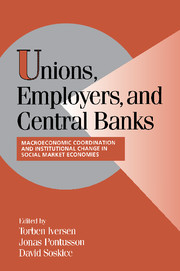3 - The Swedish Employer Offensive Against Centralized Wage Bargaining
from Part 1 - Wage Bargaining
Summary
Recent developments have brought the question of institutional change to the fore front of the research agenda of comparative political economists. In Western Europe, as elsewhere, dramatic changes in domestic politics have accompanied equally dramatic shifts in internationally determined parameters of economic performance and policy-making. It has become commonplace for students of West European political economy to speak of the decline of corporatism, that is, the decline of institutional arrangements for collaborative or “tripartite” governance of labor markets by representatives of capital, labor, and the state. Along with the profound transformations underway in the national and international governance of capital, product, and service markets, this development would appear to mark a major turning point.
This chapter treats the decentralization of wage bargaining in Sweden as a case study of institutional change. In the comparative political economy literature, Sweden has stood out as a paragon of institutionalized class compromise, and the system of centralized, economy-wide wage bargaining was, quite rightly, identified as the keystone of the Swedish system of corporatist market governance. However, this characterization of the Swedish case is no longer valid.
As we shall document, Sweden's powerful engineering employers began to push for decentralization of wage setting in the early 1980s and achieved what they wanted, in a fitful and conflictual process, by the early 1990s. At their insistence, the Swedish Employers’ Confederation (Svenska Arbetsgivareforeningen; henceforth SAF) simply closed down its own bargaining and statistics departments in the Spring of 1990. Because wage bargaining has been so important in the postwar Swedish political economy, its decentralization has altered the overall configuration of political-economic institutions (cf. Iversen this volume). Decentralization has undermined the authority and political influence of the peak organizations of labor and capital, in turn changing the politics of economic policy-making and of electoral mobilization. The campaign to decentralize wage bargaining in fact forms part of a broader business challenge to Sweden's “negotiated economy,” where all important markets are interactively regulated in a centralized, institutionalized process of bargaining among private organizations and state agencies. Advocating structural reforms - privatization, deregulation, and EC membership - leading Swedish businessmen have thus renounced their old role in co-managing the Social Democratic welfare state in the 1980s. In a dramatic act of rebellion against corporatism, for example, SAF withdrew its representatives from the boards of state agencies in 1991 (see Ahrne and Clement 1994; Pestoff 1995).
- Type
- Chapter
- Information
- Unions, Employers, and Central Banks , pp. 77 - 106Publisher: Cambridge University PressPrint publication year: 2000



